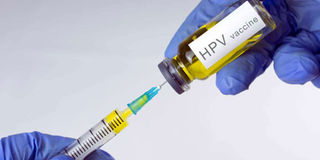HPV vaccine is effective, safe for girls

HPV vaccine. HPV infection in the genitals can cause cancer of the cervix or penis. PHOTO | FOTOSEARCH
The human papillomavirus (HPV) is a common virus associated with ano-genital cancer. Normally, people are infected with HPV if their genitals or mouths touch the genitals of someone infected with the virus.
HPV infection in the genitals can cause cancer of the cervix or penis. Other types of HPV can cause genital warts in women and men. HPV infection also causes anal cancer.
Cervical cancer affects the neck of the womb and leads to the growth of abnormal cells in the lining of the cervix. All women are at risk of cervical cancer, which often occurs in women over the age of 30.
Globally, cervical cancer ranks as the fourth most frequently diagnosed cancer and the fourth leading cause of cancer death in women with an estimated 570,000 cases and 311,000 deaths in 2018 and yet it is a preventable disease.
Cervical cancer is the leading cause of cancer death among women in Sub-Saharan Africa, including in Kenya, where it is ranked as the second most frequent cancer among women with 5,250 new cases diagnosed and 3,268 lives lost in 2018, according to the Ministry of Health.
COMPELLING EVIDENCE
In 2012, cervical cancer was responsible for 16.3 per cent of all cancer deaths in women. Researchers estimate that given the current low rates of screening and treatment, the number of deaths from cervical cancer could almost double by 2025.
In Kenya, the worrying rise in cervical and penile cancers and deaths is due to lack of awareness, failure to screen people early enough for the diseases and late diagnosis.
The role of the HPV vaccine is to prevent serious or deadly infections. The vaccine works by preparing the body to fight the germs that cause the infections. The vaccine has been shown to significantly reduce the incidence of anogenital cancer and genital warts.
Additionally, the HPV vaccine may decrease the incidence of oropharyngeal cancer as well as the maternal transmission of HPV to infants. The US Food and Drug Administration has approved three vaccines that are effective at preventing HPV infection.
These vaccines cover 2, 4, or 9 HPV sero- types. The HPV vaccine is recommended for girls and boys aged between 11 and 12 years and can be given to females and males up to 26 years. For girls and boys who receive their first dose of HPV vaccine before 15 years, only two doses are needed.
The HPV vaccine is very effective at preventing the infections caused by the virus and more than 270 million doses of the vaccine have been distributed around the world since 2006.
SEXUALLY ACTIVE
A recent study published in the Lancet in June 2019, looking at the population-level impact following the introduction of HPV vaccination programmes, showed compelling evidence of the impact of the vaccine in the reduction of HPV infections of the cervix in girls and women and anogenital warts in both sexes.
There is also strong evidence from large population based studies that shows HPV vaccination does not have any significant effect on clinical indicators of risky sexual behaviour among adolescent girls. These findings suggest that fears of increased risky sexual behaviour following HPV vaccination are unwarranted and should not stop adolescent girls from getting vaccinated. Most sexually active people will have HPV at some point in their lives, but few women will get cervical cancer. HPV vaccination is expected to reduce the burden of disease in our country in the long run.
Dr Warfa is a consultant gynaecologist oncologist, Department of Obstetrics and Gynaecology, Aga Khan University Medical College, East Africa


